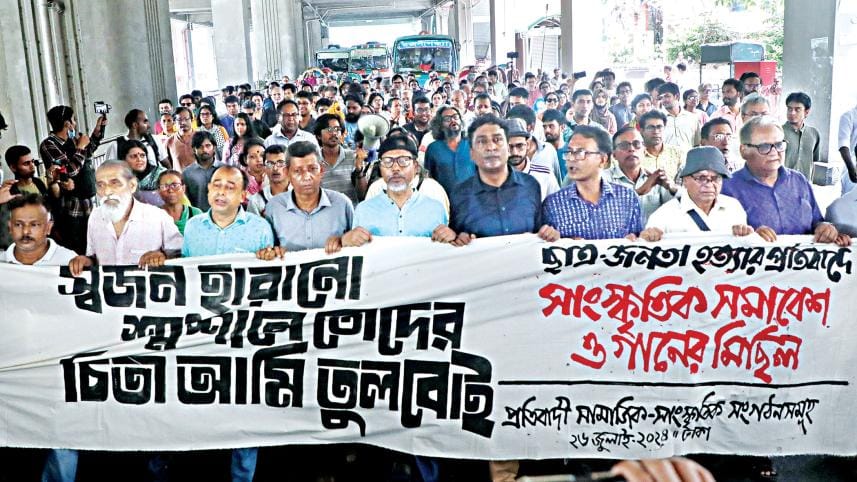July 26, 2024: Crackdown deepens, grief grows

As Bangladesh reeled from days of unrest, the government intensified its crackdown. By 6:00pm on July 26, 2024, at least 738 more people had been arrested in the capital and several other districts in connection with the ongoing violence. This brought the total number of arrests over the past seven days to over 5,522, including many leaders of the BNP and Jamaat-e-Islami.
The Dhaka Metropolitan Police (DMP) alone detained 2,357 individuals in 209 cases filed at various police stations, citing allegations of violence, vandalism, and arson targeting government establishments and other institutions. Of these, 148 were arrested on July 26.
Among the most notable detentions were three key organisers of the quota reform protests -- Nahid Islam, Asif Mahmud, and Abu Baker Majumder -- who were picked up by police from a city hospital where two of them were receiving treatment.
Junaed Alam Sharker, additional deputy commissioner of the Detective Branch of DMP, claimed the three had sought police protection and were taken into DB custody. "We will interrogate them about the incidents that took place in the last two days," he said.
Tragically, four more individuals who had suffered bullet wounds during the previous week died at hospitals in Dhaka within the 48 hours leading up to July 26, 2024. The deceased were identified as Imtiaz Ahmed Dalim, 20, a student of Southeast University; Mainuddin, 25, a madrasa student; Sohel Rana, 20; and Yeasin, 17.
Meanwhile, international voices of concern grew louder. United Nations experts issued a statement urging the Bangladesh government to ensure accountability for human rights violations, immediately halt the violent crackdown on protesters and political opponents, and fully restore access to the internet and social media platforms.
Then-prime minister Sheikh Hasina, during a visit to Dhaka Medical College Hospital around 4:30pm, condemned the recent violence and called for strict punishment for those responsible. She reiterated her appeal to the public to help identify those responsible for the attacks, calling the acts "heinous."
In a counter-statement, BNP Secretary General Mirza Fakhrul Islam Alamgir called for national unity among all democratic political and socio-cultural organisations to demand the resignation of the government. "At this critical moment of the nation, the aim of the unity will be restoration of democracy and voting rights," he stated.
Public outcry also took shape in other forms. Around 11:00am, a group of cultural and social organisations held a protest rally in front of the Jatiya Press Club, demanding an impartial UN -led investigation into the deaths, false cases, and indiscriminate arrests. They gathered under the banner "Protesting Cultural and Social Organisation."
From abroad, fifty academics under the banner of Bangladeshi Communication Scholars in North America (BCSNA) issued a statement expressing deep concern over the crackdown. They declared solidarity with the student protesters and demanded justice for the deaths of unarmed civilians. The group also called for an end to ongoing legal harassment and repression.
Adding to the chorus of concern, the Committee to Protect Journalists (CPJ) called on the Bangladeshi authorities to investigate the killings of three journalists and the ongoing attacks on reporters covering the protests.
As the day came to a close, Bangladesh remained locked in crisis -- its streets tense, its hospitals full, and its institutions under siege. While the state hardened its stance, voices from home and abroad continued to demand truth, accountability, and justice.




 For all latest news, follow The Daily Star's Google News channel.
For all latest news, follow The Daily Star's Google News channel.
Comments